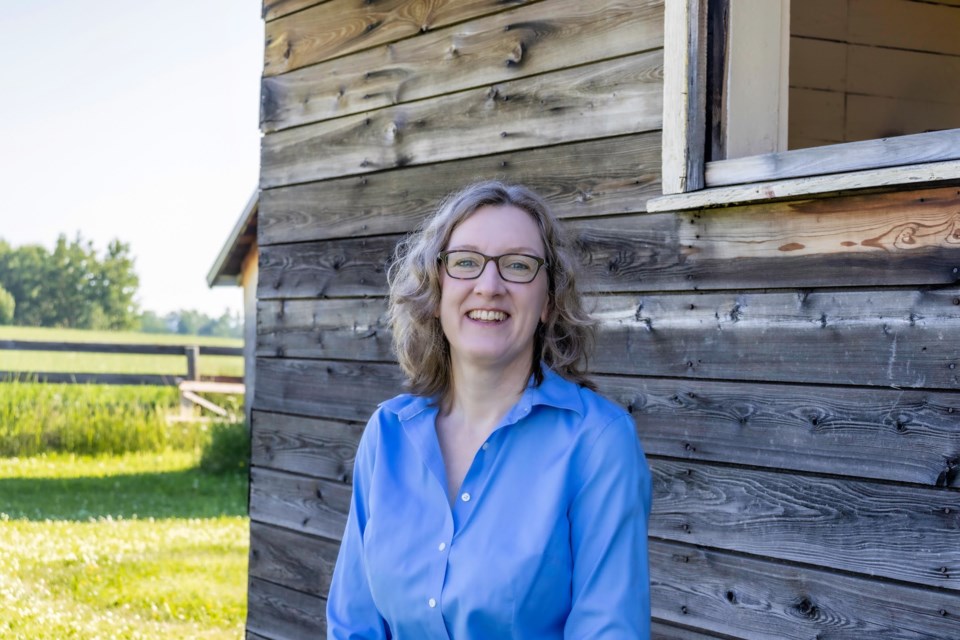A new book chronicling the stories of Glenbow Ranch Provincial Park was released on May 3, and the official book launch will take place next weekend at the very spot where all of its stories are set.
Alberta’s Cornerstone: Archaeological Adventures in Glenbow Ranch Provincial Park will be launched at Glenbow Ranch on June 18, following a speaking event featuring the author, Shari Peyerl, that was held at the Airdrie Public Library on June 7.
The book is part history, part archaeological memoir, and includes original photography and real-life untold stories.
Peyerl, an archaeologist, archivist, oral historian, and writer became involved with Glenbow Ranch as a volunteer in 2009. Since then, she has worked on excavating the historical sandstone quarry, which operated between 1907 and 1912, all while piecing together a story about the Glenbow settlement and the workers who lived there.
“The more research I did, the more involved I became and the more interested I became in all the different stories of the people who used to live and work there,” Peyerl said. “Eventually, I was accumulating so much information that hadn't been tied together before that I thought I can't let this be lost.
“I was doing oral interviews with elderly people and I thought, 'if I don't get these stories written down somewhere, nobody is going to know them but me.'”
Peyerl was required to write a report on her findings as part of her government permit for the archaeological excavation project at the park.
Once that report was completed in 2018, she felt there was so much more she wanted to know, which is what she discusses in her book.
“After I wrote the report in 2018, I did a final version of the book manuscript and sent it off,” she said. “It was really just to try and capture the history that would otherwise be lost, photographs, family history stories and tying it all together in a way that nobody ever had before.”
Through her research, she uncovered stories of characters including a local embezzler, Alberta’s first graduate nurse, a Canadian soccer champion, an acclaimed mathematician, and a member of an international spy agency.
One of her favourite stories to work on was that of the “unbreakable porcelain doll.”
“It's my favourite because it illustrates a neat story and it's about a little girl and I think so often children – and especially women and girls – are not talked about in history,” Peyerl explained.
During a 2017 excavation of the bunk house where single men lived, she found broken doll fragments.
“A piece of a doll was found and so the question is, why would there be a doll associated with a place where you've got single men?” Peyerl asked.
She discovered that the manager of the quarry at the time lived nearby with his family, including three daughters. Peyerl traced the family through time and even tracked down the descendants of the oldest daughter, Ellen.
Ellen’s daughter Dorothy shared that her mother was given an unbreakable porcelain doll while living at Glenbow village – marketed as unbreakable due to the back of the head being made of cork.
When Ellen received the doll as a present, a little neighbour boy at Glenbow village took the doll and smashed it. All that remained of the doll were its little shoes, according to Ellen’s daughter, and Peyerl explored whether the fragment she found could have been part of Ellen’s doll.
“Ellen's daughter, Dorothy, was such a lovely lady. She shared photographs with me that we had never seen before that really illuminated the archaeological work we were doing,” Peyerl said.
In turn, Peyerl was able to share photographs of Ellen at Glenbow village from the Glenbow archives that Dorothy had never seen before.
Peyerl’s relationships with descendants from the people who lived at Glenbow village allowed her to gather evidence that she otherwise would not have been able to.
“It brought in photographs and highlighted the importance of doing oral history and community outreach when you're doing history projects,” Peyerl said. “You gather so much more evidence and you get a much richer story.”
The title of the book, Alberta’s Cornerstone, stemmed from a second excavation project looking for the cornerstone of the only public building in the village of Glenbow – the Stonecutters Union Labour Hall.
Without much information on where to find it, Peyerl made an educated guess with the help of photographs, satellite imagery, land titles, and maps on where to start digging.
The day Peyerl walked across the ground and looked down on the cornerstone was very exciting, she shared.
“I actually jumped up and down a few times because I was so pleased that I had actually been able to put all the pieces together to find it,” she said.
Aside from finding this cornerstone, Peyerl also noted the Glenbow quarry served as a cornerstone to Alberta, as it provided the sandstone for many government buildings that are still standing in the province today.
“Glenbow Quarry to me is the most important sandstone quarry in the province and it's such an important point in space for the origins of the province's settler community,” Peyerl said.
Glenbow Ranch Provincial Park is located between Bearspaw and Cochrane along the Bow River. While it is still a working ranch, it’s also a destination for many visitors who can walk or cycle along the trails, learn about the area’s history, attend public events, and enjoy some spectacular views of the Rocky Mountains and Bow River.
To learn more about the park or when to visit, go to grpf.ca. To learn more about the book by Peyerl and attend the book launch, go to heritagehouse.ca




